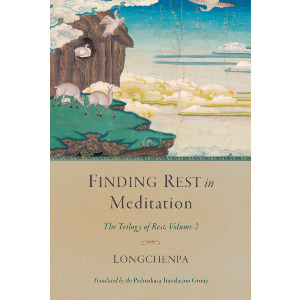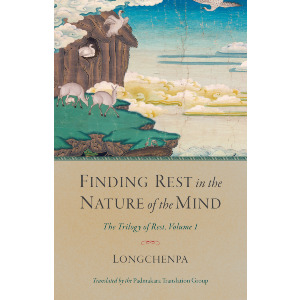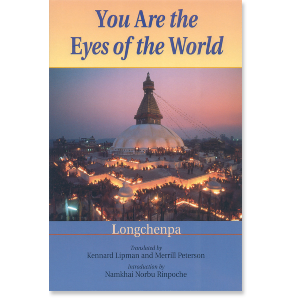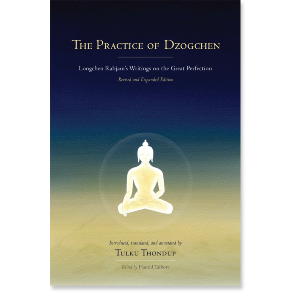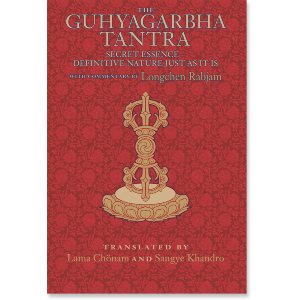Homage to you, O glorious Samantabhadra!
Your nature is the ultimate expanse,
Primordial and perfect peace.
Though free of all conceptual constructs,
It is yet embellished by the kāyas and the wisdoms
Present of themselves.
From this there radiates a myriad rays of light
Performing every kind of action
In the field of those who might be trained.
In joy and veneration I bow down to you
Samantabhadra, sun of love and knowledge—
To you and all the buddhas and their bodhisattva heirs.
Among the teachings of the Natural Great Perfection,
Whose path brings beings blessed with perfect fortune
To the city of their freedom,
Here I shall set forth this commentary,
The Chariot of Surpassing Purity.
The peak and summit of all the infinite discourses of the Sugata is the class of teachings belonging to the Natural Great Perfection. The stages in which an individual person may put this teaching into practice are defined in my text Finding Rest in Meditation. In the present commentary, I shall clearly describe the key points of its pith instructions.
The text begins with an expression of homage.
Primordial nature,
Pure and vast expanse like space itself,
Supreme reality, unmoving,
Utterly devoid of all elaboration,
Clear and lucent nature of the mind itself,
The essence of enlightenment—
In seeing this unmoving and unchanging perfect ground,
I bow in homage.
The ground of the Great Perfection is the nature of the mind, self-arisen primordial wisdom, which is motionless and transcends all conceptual extremes. Its nature is beyond differentiation. It is empty like an all-accommodating space and is luminous like the unclouded sun and moon. Like a jewel, it is in itself replete with excellence. It is within this ground, or rather this ultimate expanse—which while not existing in any way, may manifest as anything at all—that saṃsāra and nirvāṇa both subsist. And through recognizing this unmoving and unchanging ground, awareness itself, I pay homage to it. As it is said in the All-Creating King Tantra,
Kyé! Teacher of the Teachers, all-creating King!
Expanse of ultimate reality,
Nature of the buddhas of the triple time,
You do not spurn saṃsāra,
Your compassion takes no sides,
To you, O Teacher, all-creating King, I bow!
And it is also said in the Dohā, the songs of realization,
The nature of the mind is the sole seed of everything.
Existence and nirvāṇa both emerge from it.
I bow down to this mind that like a wish-fulfilling gem
Is giver of the fruits one may desire.
And again in the Ratnāvalī we find,
Like water into water merging,
Butter into butter mixing,
Well-seeing primal wisdom self-cognizing—
’Tis thus that I bow down to it.
Then comes the promise to compose the text of the commentary.
That the surpassing wonder of the Conqueror’s mind
Be realized—primal wisdom, self-cognizing—
I distilled the essence of the tantras, commentaries, and pith instructions.
Pay heed! I shall explain them in the light of my experience.
The subject of these pith instructions is self-cognizing primordial wisdom. This wisdom is the mother of all the buddhas, past, present, and to come. I will therefore explain it for the sake of future generations according to how I myself have practiced it. It is said in the Abridged Prajñāpāramitā-sūtra,
The path of past and future Conquerors
Residing in the ten directions
Is this transcendent virtue, nothing else.
The very same point is made in the Praise to the Mother,
No name, no thought, no explanation is there
For the Wisdom That Has Gone Beyond.
Unceasing and unborn, the very character of space,
It is the sphere of self-cognizing wisdom.
I bow to this, the mother of Victorious Ones
Past, present, and to come.
What is the relevance of citing this transcendent virtue in the context of an exposition of the Great Perfection? The reason is that transcendent wisdom itself is the Great Perfection. For this is how all the Victorious Ones of the three times refer to awareness itself. It is that from which they take their birth. As it is said in the All-Creating King,
Kyé! I am the essence uncontrived just as it is.
I am beyond both being and nonbeing.
The Victorious Ones of the three times come forth from me,
Thus truly am I called the mother of Victorious Ones.
This section reveals the reason for the composition of this treatise. I shall now explain the main body of the root text first briefly and then in detail.
First, there comes a brief and summary description of its pith instructions.
On mountain peaks and lake isles, or in forest groves,
Congenial to the mind in the four seasons of the year,
With single-pointed concentration, serene, unmoving,
Meditate on luminosity devoid of mind’s construction.
Depending on three things is this accomplished:
The place, the persons, and the practices they implement.
If those who wish for liberation settle evenly in profound concentration in places suited to their temperament and appropriate to the four seasons of the year, it is certain that they will achieve their purpose. And since liberation is perfectly accomplished thanks to three factors—the place where the practice is pursued, the practitioners themselves, and the teachings they practice—these three points form the adamantine body of this treatise, and I shall now explain them successively and in detail.
This has been excerpted from Finding Rest in Meditation.
Related Books
$24.95 - Hardcover
Finding Rest in the Nature of the Mind
$34.95 - Hardcover
$24.95 - Paperback
$44.95 - Hardcover
$150.00 - Hardcover
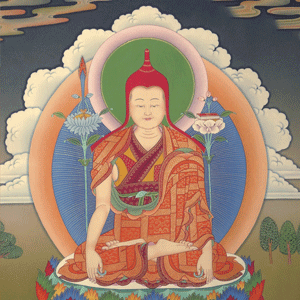 Longchen Rabjam (1308–1363), also known as Longchenpa, is a great luminary of Tibetan Buddhism. See more about him here.
Longchen Rabjam (1308–1363), also known as Longchenpa, is a great luminary of Tibetan Buddhism. See more about him here.



